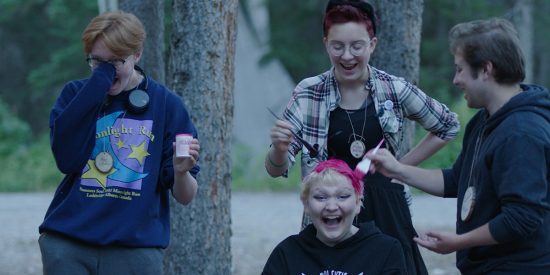TIFF 2023 Review: Summer Qamp – “An overwhelming sense of optimism”

Courtesy of TIFF
It’s easy to see why director Jen Markowitz was inspired to bring the stories of those attending Camp fYrefly to the screen for her feature debut. These teenagers are inspiring, courageous, and willing to share their stories with refreshing honesty and emotion.
Camp fYrefly is a retreat for queer, non-binary and trans youth. It’s a space where kids can be themselves, and can discover themselves. It’s a safe space where privacy and confidentiality are part of the deal, both inside and outside the campus. Here in Alberta, Canada, where areas of the province are often some of the more socially conservative, this is a haven for LGBTQ+ kids, some of whom haven’t even been able to reveal their true selves to their families.
These are teens all facing big conversations and for some, still big questions about their identity and what it means. Some feel the need to find those labels, others wish to shed their restrictive nature yet all of them create an environment where they are free to be themselves. As ones notes, the camp doesn’t just give the opportunity to be supported, but also to support, which can be just as important in solidifying a sense of self.
Summer Qamp easily demonstrates the importance of freedom of expression. It truthfully would be a great double bill with the Sundance favourite Theater Camp, recently released, which also centred around a group of kids who could flourish in a judgement-free zone. In the end, we get to see kids being kids, doing things every camp-goer should get a chance to enjoy – archery, climbing, horsemanship, dance, crafts. But most important is the friendships and bonds these kids make. For some, especially those residing in more rural towns, it is the only (and sometimes first) link to the queer community.
It’s sad and frustrating to think that when these kids leave Camp fYrefly they may have to go back to homes and schools where they don’t feel supported, where some even need to hide their true selves. Yet Markowitz ends things on a high note, with kids promising to come back next year, revelling in their last night together, making plans on how they can give back in the future.
Summer Qamp lets us into the lives of these amazing young people who have not always had an easy life, who are open about the discrimination, the bullying, and the anxiety they’ve faced. But as in most of the film, the overall feeling is joy, queer joy (as they enthusiastically chant) and the kids, as well the audience, is left with an overwhelming sense of optimism. If films like these can help those of us outside the LGBTQ+ community relate and empathize with those inside it, then we are one step closer to having that freedom of self that Summer Qamp provides.










